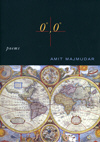0º,0º
Scientific metaphors are invisible pitfalls for most poets, mainly because the average writer is unable to grasp how wildly ridiculous his or her musings and conjectures are. Reciprocally, poetry put forth by physicists, if sincere, can leave one rather cold. Fortunately, Amit Majmudar easily sidesteps both problems in this wonderful collection by having both a real scientific background and genuine empathy, creating a coherent work with sustained intellectual and emotional focus.
Scientific metaphors are invisible pitfalls for most poets, mainly because the average writer is unable to grasp how wildly ridiculous his or her musings and conjectures are. Reciprocally, poetry put forth by physicists, if sincere, can leave one rather cold. Fortunately, Amit Majmudar easily sidesteps both problems in this wonderful collection by having both a real scientific background and genuine empathy, creating a coherent work with sustained intellectual and emotional focus.
This book has all the ambition appropriate for a serious writer yet early in his career: breadth of scope and technique; restraint with a healthy dose of the obscene (“The serpent / dove in her through the nest-hole anus / until the scorpion-stinger coccyx / slurped in too”); and a strong connection to the poetic past. And for the most part, he succeeds on all counts.
A few lines that exhibit how Majmudar fires on all cylinders comes from his poem, “Answers for the whirlwind,” a breathless, sharp response from Job. Consider how he moves from precise, modern phrasing such as:
They dream of the freedom to flow once again
The speed and freedom that you took from them
And throw their flanks at the Tropic of Cancer
Like an electric fence and stagger backward
to the bold incantations of: “tell me has / Desire ever stripped the stringy husk / Off of your mind and shown you still unripe” or the simple truth of: “Speak if you have something more than wisdom / Speak if you have sympathy.”
The book is divided into five sections more or less focused on religion, art, war, love, and death. Since Majmudar is a doctor, it is not surprising to see many reflections on death, and especially on those who made the ultimate sacrifice. However, these are the weakest parts, too caught up in verbose descriptions and grasping at depth. Not that these are weak poems – they just pale in comparison to the probing, original mind that muses and draws connections between everything from antimatter to Golgotha.
However, to quote one great section from the last poem in the book, “The Miscarriage,” that conjures up Eliot’s Quartets (again not surprising given Majmudar’s dispositions):
Forgive me if I had no words that night
But I was wondering in the still
Begetting silence whether to console you
If I consoled you it would make the loss
Your loss and so we laid beside ourselves
A while . . .
To touch again on the firm grasp of science, here is a bit from “Static Electricity” showing scientific humor at its best:
Either she is electrically fenced off
at some subatomic level, and this is nature telling me
KEEP OUT, or else the electrons could be flowing
out of me into her, in which case her body bodes well
as a conduit for release . . .
“Subtle Anatomy” is the best poem in this collection – first published in Journal of Medical Humanities – you just never know where things will turn up. Romantic, visionary, grand in a reasonable tone, all in one page. It speaks of the fall from heaven and the angelic and devilish vestiges left in our bodies:
He straightened her, the breath in a balloon,
into this human posture of rebellion,
this upright and bipedal challenge.
Settled, the serpent sent nerves everywhere,
claiming each inch of her with senses.
Not with an apple but an apple’s taste
the serpent ruined her . . .
The nods to formal poetry, such as the handful of ghazals, are worthy attempts, carrying much of the mystical weight of the devotional genre. However, they sound like translations, which is either playful genius, or betraying a lapse of musicality in the short poem. The sonnets are also spotty, although there is a fun rhythm in “A Pedestrian,” shifting from a halting walk in the octave to an all-out dash in the turn.
All in all, 0º, 0º showcases a brilliant mind wise enough to not be content with only intellectual musings, but that tries to get to the heart of feeling, that can contemplate the mystery floating just behind any object or concept. Amit Majmudar’s poetry indeed does an enviable thing: it motivates us to examine how he is doing it better, and what he can bring not only to our lives, but to our own writing.





